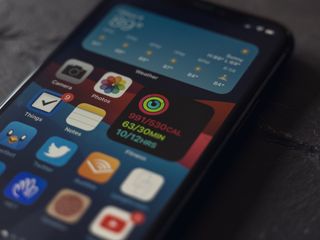New App Store bill mistakes 'great products for market power', says group

What you need to know
- The American Enterprise Institute has blasted a new App Store billed aimed at Apple and Google.
- Economics and antitrust expert Mark Jamison says the bill mistakes "great products for market power."
- He also stated that the app economy built on iOS and Android was "vibrant and robust".
The American Enterprise Institute has slammed a proposed App Store bill that would seek to curb the control Apple and Google have over iOS and Android app distribution, stating the move would harm both consumers and the app economy.
Writing for AEI Mark Jamison states:
The "Open App Markets Act," introduced in the Senate last week, is the latest salvo against Americans who enjoy iPhones and Android phones. Other volleys have been from video game maker Epic Games, the European Union (e.g., here and here), several state attorneys general, and antitrust bills already being considered in Congress. Like these, the new proposed legislation is an example of policymakers mistaking great products for market power.
Jamison notes how iPhone and Android have helped to accelerated mobile broadband adoption, and how devices like Apple's best iPhones have helped keep people connected during the pandemic. Noting the findings of the bill's sponsors, Senators Richard Blumenthal (D-CT), Amy Klobuchar (D-MN), and Marsha Blackburn (R-TN), Jamison notes that they "have concluded that Apple and Google are "wielding incredible power," denying "startup tech companies a fighting chance," and engaging in practices that are "a direct affront to a free and fair marketplace" but that "facts say otherwise."
An AEI working paper notes a study into businesses choosing Android or iOS:
Of the 47 business categories we studied, 16 were associated with firms that exhibited a strong preference for using mobile platforms. Most viewed iOS and Android as clear substitutes or at least complements, implying that Apple and Google are in competition for these startups' business. Companies that had clear preferences between iOS and Android tended to be lukewarm on using mobile platforms altogether, also implying no market power.
Jamison further states "the facts also indicate that the app economy built on these platforms is vibrant and robust, in direct contradiction with the senators' claims", the group has found that US startups "accelerated rapidly once Apple introduced the iPhone" and that the platforms' contributions to the economy actually accelerated during the pandemic:
These growth statistics contradict the senators' market-power assertions. Market power is the ability to raise prices and suppress output without inviting more competition. Apple and Google appear to be encouraging growth, not suppressing it. And their fees appear on par with platforms.
Jamison goes as far as to say that the proposed legislation would actually "damaged the value consumers receive from Apple's and Google's platforms" because of the requirement to permit third parties to install their own app stores, bypassing other app stores and permitting third-party payment systems:
These requirements damage consumers in part because they run counter to what consumers want. Google allows some of activities the bill would require — including app store "sideloading" — but Apple does not. And Apple's customers seem to prefer it that way, as do some app developers. Google caters to techies, while Apple serves people who love their slick, easy-to-use devices. The act would make iOS more like Android and, in doing so, would damage the people-oriented technology leader that Steve Jobs created.
You can read the AEI's full assessment of the proposed legislation here.
Master your iPhone in minutes
iMore offers spot-on advice and guidance from our team of experts, with decades of Apple device experience to lean on. Learn more with iMore!

Stephen Warwick has written about Apple for five years at iMore and previously elsewhere. He covers all of iMore's latest breaking news regarding all of Apple's products and services, both hardware and software. Stephen has interviewed industry experts in a range of fields including finance, litigation, security, and more. He also specializes in curating and reviewing audio hardware and has experience beyond journalism in sound engineering, production, and design.
Before becoming a writer Stephen studied Ancient History at University and also worked at Apple for more than two years. Stephen is also a host on the iMore show, a weekly podcast recorded live that discusses the latest in breaking Apple news, as well as featuring fun trivia about all things Apple. Follow him on Twitter @stephenwarwick9
Most Popular





